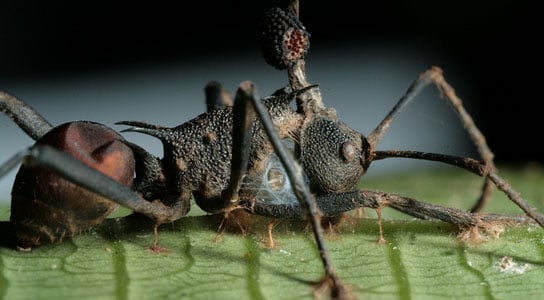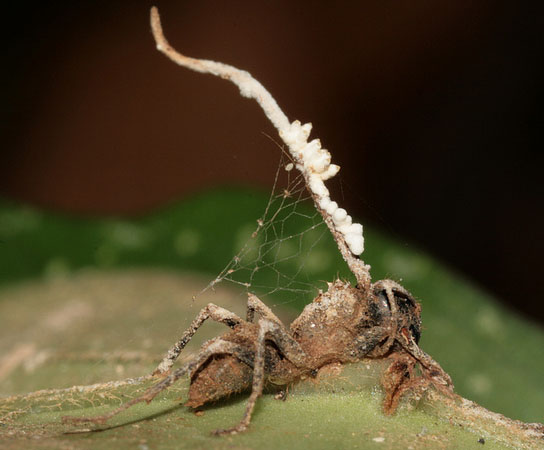Hyperparasite Fungus Limits the Effects of ‘Zombie-Ant’ Fungus
May 3, 2012

A parasite that fights the zombie-ant fungus has yielded some of its secrets to an international research team led by David Hughes of Penn State University. The research reveals, for the first time, how an entire ant colony is able to survive infestations by the zombie-ant fungus, which invades an ant's brain and causes it to march to its death at a mass grave near the ant colony, where the fungus spores erupt out of the ant's head. This photo shows a zombie ant with the brain-manipulating fungus (Ophiocordyceps unilateralis s.l.) having been castrated by an hyperparasite fungus (white with yellow material). This is no longer a threat to the ants. Image: David Hughes
A parasite that fights the zombie-ant fungus has yielded some of its secrets to an international research team led by Penn State’s David Hughes. The research reveals, for the first time, how an entire ant colony is able to survive infestations by the zombie-ant fungus, which invades an ant’s brain and causes it to march to its death at a mass grave near the ant colony, where the fungus spores erupt out of the ant’s head. “In a case where biology is stranger than fiction, the parasite of the zombie-ant fungus is itself a fungus — a hyperparasitic fungus that specializes in attacking the parasite that turns the ants into zombies,” Hughes said. The research will be published in the journal PLoS ONE.
“The hyperparasitic fungus effectively castrates the zombie-ant fungus so it cannot spread its spores,” said Hughes, who is an assistant professor of entomology and biology, and a member of the Center for Infectious Disease Dynamics at Penn State. “Because the hyperparasitic fungi prevents the infected zombie-ant fungus from spreading spores, fewer of the ants will become zombies.”
As part of their research, the scientists created a detailed model that revealed previously unknown details of the interactions between the fungus-infected ants and the parasite-infected zombie-ant fungus. Scientists previously had known that ants defend their colonies against microscopic enemies such as fungal spores by efficiently grooming each other. In this study, the researchers also modeled the effect of ant behavior on limiting infection. “Interestingly, beyond the well known effect of defensive ant behavior, our new research reveals the added effect of the castrating actions of the hyperparasite fungi, which may result in significantly limiting the spread of the zombie-ant fungus” Hughes said.

A parasite that fights the zombie-ant fungus has yielded some of its secrets to an international research team led by David Hughes of Penn State. The research reveals, for the first time, how an entire ant colony is able to survive infestations by the zombie-ant fungus, which takes over the brain and then ejects its spores out of the ant's head. Image:David Hughes
The research was performed by an international group of scientists from University of Copenhagen, Denmark, Federal University of Vicosa, Brazil and Penn State in the United States. The research is funded by a Marie Curie OIF Fellowship (PIOF-GA-2008-221041), Danish National Research Foundation and Brazilian National Council for Research (CNPq, grant no. 401610/2009-8) and Penn State.
Source: Penn State University
No comments:
Post a Comment